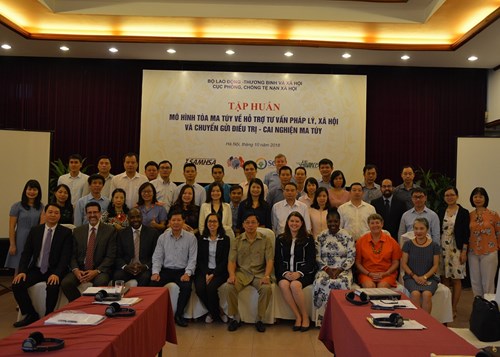This includes individuals from Vietnam’s Ministry of Labor, Invalids and Social Affairs (MOLISA), People’s Supreme Court, Ministry of Health, the Steering Board on Drug Control of Hanoi, Vietnamese court officials, public health centers, as well as social workers and relevant staffs from Nam Tu Liem and Long Bien districts. Participants are learning about the U.S. drug court-based model that has proven to reduce drug use, reduce crime, and save money through a collaborative approach between the courts and treatment community.
    |
 |
|
Mr. Nguyen Xuan Lap, Director of Social Vices Prevention Department, MOLISA made a speech at the Opening Ceremony |
Representatives from the U.S. National Association of Drug Court Professionals (NADCP) are building capacity of appropriate procedures and guidelines to be developed for the piloting of 2 drug treatment courts in Hanoi this week and for the 2 drug treatment courts in Ho Chi Minh City next week. The training includes lectures describing practices that have led to favorable outcomes in the United States and several other countries, as well as interactive planning sessions that will begin the process of designing the pilot drug courts.
At the Opening Ceremony, Mr. Nguyen Xuan Lap, Director of Social Vices Prevention Department, MOLISA, described the drug addiction situation in Vietnam and recent achievements in providing quality treatment to drug addicts. He appreciated the support from the State Department’s Bureau for International Narcotics and Law Enforcement (INL) and National Association of Drug Court Professionals to facilitate this initiative.
    |
 |
|
Participants at the training in group photos |
U.S. State Department Charlotte Sisson, Senior Foreign Affairs Officer on Drug Demand Reduction remarked, “Through the Colombo Plan the United States is supporting Vietnam as they seek to pilot drug treatment court programs in Vietnam aimed at improving treatment and recovery for those with substance use disorders.” “The U.S. supports Vietnam in their goals to improve treatment practices for drug users and having diverse collaboration amongst participants from the government, medical workers, legal affairs officers, social workers, and representatives from methadone clinics, health clinics, and drug treatment centers is encouraging to the success of the pilot," said Sisson. “Through the drug treatment court model Vietnam will be able to encourage the success of participants through a various range of treatment options.”
Since 1994, the National Association of Drug Court Professionals (NADCP) has trained hundreds of thousands of professionals spanning legal, clinical, psychosocial, and law enforcement fields. NADCP regularly publishes cutting-edge, research-based materials—including the groundbreaking U.S. Adult Drug Court Best Practice Standards—and the association works tirelessly to improve the response of the American justice system to people with substance use and mental health disorders. For more information go to AllRise.org.
The State Department’s Bureau for International Narcotics and Law Enforcement (INL) utilizes innovative programming and proven approaches to prevent and treat substance use in over 90 countries around the world. “We work to raise standards of treatment and care; conduct clinical skills training and credentialing of professionals; and support long-term recovery.” INL also collaborates with international organizations, such as the Colombo Plan, the United Nations Office on Drugs and Crime (UNODC), the Organization of American States Inter-American Drug Abuse Control Commission (CICAD), the African Union, and the World Health Organization (WHO), to advance regional cooperation and exchange best practices. For more information, go to https://www.state.gov/j/inl/rls/fs/2017/260821.htm.
The United States supports Vietnam in their goals to improve substance use disorders treatment practices in the context of community based treatment and alternatives to incarceration. In addition to introducing drug courts for those who commit crimes as a result of their addiction, the United States is also supporting Vietnam as they teach law enforcement how to partner with addiction treatment professionals to divert drug users away from the criminal system and into community treatment and HIV services. The United States also looks forward to continuing a long-term partnership with Vietnam in their efforts to treat those with substance use disorders through evidence based practices.
Reported by Chung Anh